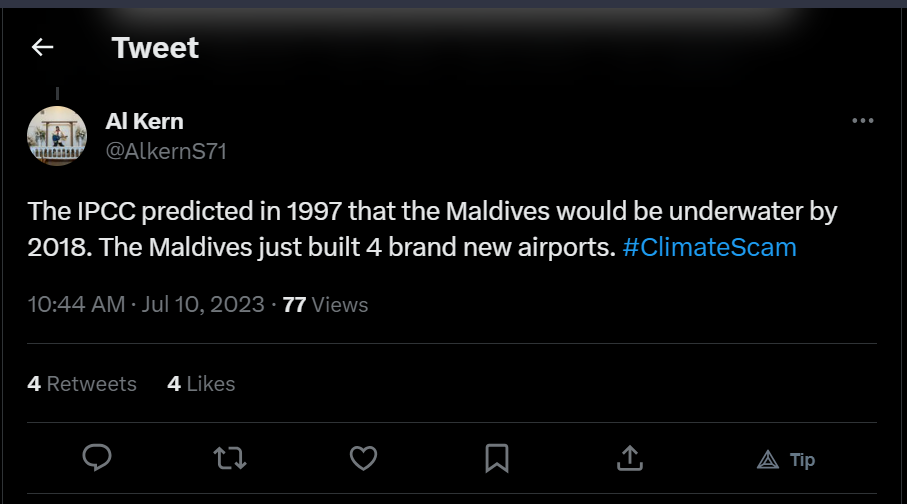Physical Address
23,24,25 & 26, 2nd Floor, Software Technology Park India, Opp: Garware Stadium,MIDC, Chikalthana, Aurangabad, Maharashtra – 431001 India
Physical Address
23,24,25 & 26, 2nd Floor, Software Technology Park India, Opp: Garware Stadium,MIDC, Chikalthana, Aurangabad, Maharashtra – 431001 India

CLAIM – The IPCC predicted in 1997 that the Maldives would be underwater by 2018. The Maldives just built four brand-new airports.
FACT – false information. The IPCC has not made specific predictions about the submergence or disappearance of individual islands or countries by particular dates.
Claim Post:

WHAT DOES THE CLAIM SAY
A Twitter postdated July 10, 2023, by user @Alkerns71 misleads people to think that the Intergovernmental Panel on Climate Change (IPCC) predicted in 1997 that the Maldives would be underwater by 2018. It further highlights the construction of four new airports in the Maldives as evidence contradicting the climate change concerns for the country. It implies that the construction of four brand-new airports in the Maldives contradicts the concerns about climate change and rising sea levels.
WHAT WE FOUND
It is important to note that the claim misrepresents the IPCC’s predictions and the actions taken by the Maldives. The IPCC does not make specific predictions about the submergence of individual islands or countries by fixed dates. Their assessments focus on global climate change trends and potential impacts rather than making precise predictions about specific locations. Also, The Maldives has invested in building new airports, but this does not contradict the concerns about climate change and sea-level rise. Infrastructure development, including airports, is a separate issue from the long-term effects of climate change on low-lying regions. Countries can undertake various projects for economic and tourism purposes while still being aware of potential climate risks.
In this article, we will delve into the facts surrounding this claim and clarify the relationship between the Maldives’ airports and the ongoing challenges posed by climate change.
The IPCC’s Assessments and Sea-Level Rise:
The IPCC is a widely respected scientific body that provides comprehensive assessments of climate change. While the IPCC has consistently warned about the risks of rising sea levels and the vulnerability of low-lying coastal regions, it does not make specific predictions about the fate of individual islands or countries by fixed dates. In 1997, the IPCC released its Second Assessment Report, which provided a comprehensive assessment of the scientific understanding of climate change at that time. At the same time, the report highlighted the potential impacts of climate change, including rising sea levels. The Third Assessment of the IPCC Report was published in 2001. It also highlights the possible consequences of climate change. These reports aim to inform policymakers and the public about the scientific understanding of climate change and its impacts without specifying exact timelines for specific locations.
Read more—intergovernmental Panel on Climate Change (IPCC). (2001). Climate Change 2001: The Scientific Basis. https://www.ipcc.ch/site/assets/uploads/2018/03/TAR-01.pdf
The Maldives’ Vulnerability to Climate Change
While the prediction in question is false, it is essential to acknowledge that the Maldives remain highly vulnerable to climate change and its associated risks, including rising sea levels. As an archipelago nation with low-lying islands, the Maldives faces significant challenges in mitigating and adapting to the impacts of climate change. The Maldivian government has proactively recognised these risks and implemented measures to protect their country. These initiatives include coastal protection strategies, sustainable tourism practices, renewable energy projects, and active international advocacy for climate action.
Like many other low-lying coastal regions, the Maldives is experiencing climate change’s consequences. The impacts are primarily driven by rising sea levels, significantly challenging the country’s natural and human systems. Here are some current critical effects of climate change in the Maldives.
Sea-Level Rise – The Maldives is particularly vulnerable to rising sea levels due to its low-lying topography. According to a study published in Nature Climate Change, it is estimated that a 0.5-meter rise in sea levels could result in 77% of the Maldives being submerged by the end of the century. This would severely affect the country’s land area, infrastructure, and coastal communities.
Erosion and Coastal Flooding – Increased Sea levels contribute to erosion and coastal flooding, further exacerbating the vulnerability of the Maldives. Beach erosion and inundation of coastal areas have already been observed, impacting both natural habitats and human settlements. These changes threaten the country’s tourism industry, which heavily relies on pristine beaches and coastal attractions.
Coral Bleaching and Reef Degradation: Climate change-induced ocean warming and acidification lead to coral bleaching and reef degradation in the Maldives. Coral reefs provide critical habitats, support fisheries, and protect coastlines from wave energy. The loss of these ecosystems has far-reaching consequences for marine biodiversity, livelihoods, and tourism.
Freshwater Resources – Climate change affects freshwater resources in the Maldives, as rising sea levels intrude into freshwater lenses, the primary drinking water source. Saltwater intrusion contaminates freshwater supplies and reduces the availability of clean water for both domestic use and agriculture.
Increased Storm Intensity: Climate change can contribute to more intense and frequent storms in the region. Stronger storms bring higher wind speeds, storm surges, and heavy rainfall, increasing coastal erosion risks, flooding, and infrastructure damage.
Conclusion:
The claim that the IPCC predicted the complete submergence of the Maldives by 2018 is not supported by any credible evidence. The IPCC has not made specific predictions about individual locations or fixed dates but provides assessments on climate change trends and potential impacts. While the Maldives remains vulnerable to the effects of climate change, the government has taken proactive steps to address these risks and ensure the long-term sustainability of their nation. By relying on accurate scientific information, we can better understand the challenges of climate change and work towards practical solutions for a sustainable future.
If you have any queries or come across suspicious content related to climate change or the environment and want us to verify them for you, then send them to us on our WhatsApp hotline: +917045366366
-With Inputs from Nuwandhara Mudalige-
References:
Intergovernmental Panel on Climate Change (IPCC). (2001). Climate Change 2001: The Scientific Basis. https://www.ipcc.ch/site/assets/uploads/2018/03/TAR-01.pdf
Majeed, M. A., et al. (2019). Coastal vulnerability assessment of Kulhudhuffushi Island, Maldives, to storm surges induced by climate change. Environmental Earth Sciences, Ministry of Environment, Energy, and Water (Maldives). (2021). Maldives Climate Change Policy. http://www.environment.gov.mv/Policy%20&%20Plans/MCCP%202021.pdf